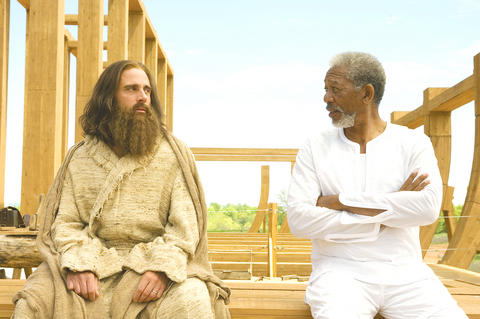Evan Almighty, in which Steve Carell, playing a newly elected congressman from Buffalo, is commanded by God (Morgan Freeman) to build an ark, is a movie far less interesting than its premise. It is also slightly less interesting than its hugely popular predecessor, Bruce Almighty, which starred Jim Carrey. But there is nonetheless a fruitful franchise in the making here, a potentially endless series of movies with popular, sometimes naughty comedians acting out wholesome modern-day versions of well-known Bible stories.
Think of the possibilities: In Stan Almighty, Freeman tells Sacha Baron Cohen to kill off one of his kids (whichever Breslin, Culkin or Fanning is furthest from puberty); in Doug Almighty, Will Ferrell is swallowed by a computer-generated whale; and in Jane Almighty, a virginal Sarah Silverman finds herself pregnant with Freeman's child. Eventually, Dave Chappelle will fight the battle of Jericho and the culture wars will have officially ended.
Meanwhile we can ponder the lessons of Evan Almighty, which combines bland religiosity and timid environmentalism into a soothing Sunday-school homily about the importance of being nice. As I understand it, the God of the Old Testament is a pretty tough deity, but it is not in Freeman's nature to be wrathful or jealous. His God is more a practical joker than a smiter, and his intervention in human affairs (and in the American legislative process) more therapeutic than punitive.

PHOTO: COURTESY OF UIP
At first, Evan is a twitchy, gung-ho careerist - for some reason, Carell seems to be trying out a Greg Kinnear impersonation - who drives a Hummer, neglects his family and falls under the unsavory sway of a corrupt committee chairman (John Goodman). Then the Lord appears, followed by truckloads of wood (funny, I always thought hickory barky barky was the traditional ark-building material) and hundreds of animals. The birds relieve themselves first on Carell, then on Goodman, who is also spat upon by an alpaca.
Both men retain their good humor. Lauren Graham, who plays Evan's wife, Joan (get it?), has a harder time finding anything amusing to do, and the couple's three sons (Johnny Simmons, Graham Phillips and Jimmy Bennett) barely register. A gaggle of gifted comic actors - Wanda Sykes, Molly Shannon, Jonah Hill - read their lines and cash their checks, and Jon Stewart has a cameo.
Carell, once again, encounters some hair-removal issues. Otherwise, most of the humor consists of cute biblical references (Shannon's character is a real estate agent named Eve Adams), carpentry slapstick (Carell smites his thumb with a hammer or falls off a beam) and animal gags. There is not much in the way of wit, emotional complication or suspense, and as Evan's initial skepticism turns to righteousness he seems to fall into a trance. If you feel yourself doing the same, chances are it is the result of boredom, not beatitude.

One of the biggest sore spots in Taiwan’s historical friendship with the US came in 1979 when US president Jimmy Carter broke off formal diplomatic relations with Taiwan’s Republic of China (ROC) government so that the US could establish relations with the People’s Republic of China (PRC). Taiwan’s derecognition came purely at China’s insistence, and the US took the deal. Retired American diplomat John Tkacik, who for almost decade surrounding that schism, from 1974 to 1982, worked in embassies in Taipei and Beijing and at the Taiwan Desk in Washington DC, recently argued in the Taipei Times that “President Carter’s derecognition

This year will go down in the history books. Taiwan faces enormous turmoil and uncertainty in the coming months. Which political parties are in a good position to handle big changes? All of the main parties are beset with challenges. Taking stock, this column examined the Taiwan People’s Party (TPP) (“Huang Kuo-chang’s choking the life out of the TPP,” May 28, page 12), the Democratic Progressive Party (DPP) (“Challenges amid choppy waters for the DPP,” June 14, page 12) and the Chinese Nationalist Party (KMT) (“KMT struggles to seize opportunities as ‘interesting times’ loom,” June 20, page 11). Times like these can

June 23 to June 29 After capturing the walled city of Hsinchu on June 22, 1895, the Japanese hoped to quickly push south and seize control of Taiwan’s entire west coast — but their advance was stalled for more than a month. Not only did local Hakka fighters continue to cause them headaches, resistance forces even attempted to retake the city three times. “We had planned to occupy Anping (Tainan) and Takao (Kaohsiung) as soon as possible, but ever since we took Hsinchu, nearby bandits proclaiming to be ‘righteous people’ (義民) have been destroying train tracks and electrical cables, and gathering in villages

Dr. Y. Tony Yang, Associate Dean of Health Policy and Population Science at George Washington University, argued last week in a piece for the Taipei Times about former president Ma Ying-jeou (馬英九) leading a student delegation to the People’s Republic of China (PRC) that, “The real question is not whether Ma’s visit helps or hurts Taiwan — it is why Taiwan lacks a sophisticated, multi-track approach to one of the most complex geopolitical relationships in the world” (“Ma’s Visit, DPP’s Blind Spot,” June 18, page 8). Yang contends that the Democratic Progressive Party (DPP) has a blind spot: “By treating any